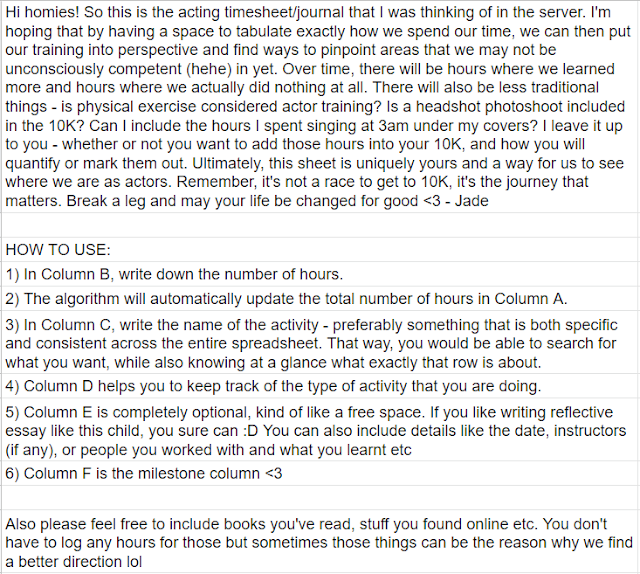What is Acting 10K?
A little while back, I wrote a little essay in Frames - home of my international acting family - about where I currently felt like I was in my journey as a performer.
Whenever I think of my acting journey, I see it from the lens of Broadwell's Four Stages of Competence. They are, in order, (1) Unconscious incompetence, (2) Conscious incompetence, (3) Conscious competence and (4) Unconscious competence. I found this system incredibly apt as a descriptor because of how abstract the performing arts is, especially acting and singing. You really don't know what you don't know until you are given the tools to sharpen what you already have physically and mentally.
Conscious incompetence, in particular, can be extremely draining because you realize that there is so much you have yet to learn, and so much to do. Even though it's a much better position to be in than to not even know that we need to train and improve, the stress of constantly growing and worrying if we are keeping up can become a source of demotivation. I'm trying to be conscious of that kind of negative self talk - things like "I'm never going to make it past this roadblock" or "why is everything so hard, I want to give up". I need to stay strong and keeping going till I'm in Stage 4.
Thankfully, conscious incompetence can also be a good thing. I know that it means I can continue to grow and that the only way is up. I have some bad habits that I must break before I can get there, such as the tendency to limit myself to experiences that I am already comfortable with. That starts with taking a course in music theory and composition this semester (good luck to me lmao), doing voice, acting, rehearsal and so on, and going all out with my various acting ventures, not just in quantity but in quality as well. I want to get my "Little Miss 30 Hours A Week" back, and I will.
A lively conversation started to discuss just how much is enough. I brought up the 10,000 hours of deliberate practice it takes for someone to become world class at what they do. I am mindful that what Malcolm Gladwell wrote in his book Outliers may not apply to everyone, and that various sources have described Gladwell's rule as a "provocative generalization" that misconstrues the purpose of Anders Ericsson's research on expert musicians. In reality, not every hour of learning is equally helpful, and to see 10,000 hours as a hard and fast rule to work towards would be a gross oversimplification of what practice really is about. Therefore, when I applied this philosophy to the study and practice of acting, I do it with the awareness that it was never about hitting 10,000. Rather, it is the journey and the constant attention paid to conscious and documented practice sessions that would make the formative years of young artists such as the college-aged actors of Frames.
With that in mind, I said, "Dude, you know what? We should start an Excel sheet. Shared or not, doesn't matter. But we tabulate the number of hours we spend on training and see where we are at, say, each 500-hour mark."
That set the course for a flurry of activity as I programmed an AutoSum function into the spreadsheet. Never thought I'd see the day where GEA1000 would come in handy! I then built the rest of the spreadsheet to include a section for categories, reflections and motivational shoutouts (from ourselves and each other). After that, I began loading my content in.
It helped that we were already pretty tight as friends, and I'm more than happy to trust them with whatever I'm working on.
Here's my spreadsheet:
The point of this exercise is to encourage deliberate practice. Unlike some sources which define deliberate practice as working under a trained eye, the performing arts can be a lot more chaotic. Was it really practice if we spent a day in drama school dozing off in class? Was that intensive character study late in the middle of the night more valuable than the time waiting around on set? Or were each of those experiences valuable in different ways? That's where the reflections come in to qualify the hours and to provide an individualized approach to every actor's learning journey.
Through Acting 10K, I have found that those of us who participated tended to be more driven in achieving more hours, and getting the daily practice in. Even though it's been reiterated that the number of hours spent practicing is not equivalent to the excellence of the outcomes, this has not deterred us from working on our craft anyway, and in my eyes that is an absolute win. An actor has everything to gain from more deliberate and targeted practice, and over time, it becomes easier to identify goals and coaching methodologies for each session to make the hour as productive as possible.
Of course, ultimately, what Acting 10K would achieve for us is to distill and clarify what works and what does not. By understanding that 10,000 hours can look very different from person to person, and knowing what exactly goes into a person's 10,000 and what realizations happened within each of those hours can be the pivotal difference between "I will never be as good as them" and "If they can, so can I". To illustrate that point, here's an example of my post-practice reflection on the 9th of August:
August 9th, 2022. Learning to set up space before singing. In this practice session, I realized that I still have the tendency to get constricted in my throat when practicing in a live space. Upon further reflection, I recalled that I had been tensing up my entire vocal tract while feeling wobbly - I was not anchoring properly for the high notes. Getting distracted by the crowds streaming past the Esplanade was another factor. I have to try and integrate all of those techniques together in my next practice session.
While there is no format, I outline the date, goals of the session, my discoveries and takeaways, as well as what I think I need to do after this session. Through reflective practice sessions like this - my journal in a sense, I can then keep track of very specific goals that I want to achieve as a performer. I'll keep exploring more ways to work on my technique, and Acting 10K is one such way I can do that.
I'll be linking the template here. Feel free to duplicate it and use it for yourself - even for something outside of acting (just edit the categories). Have fun!



Comments
Post a Comment